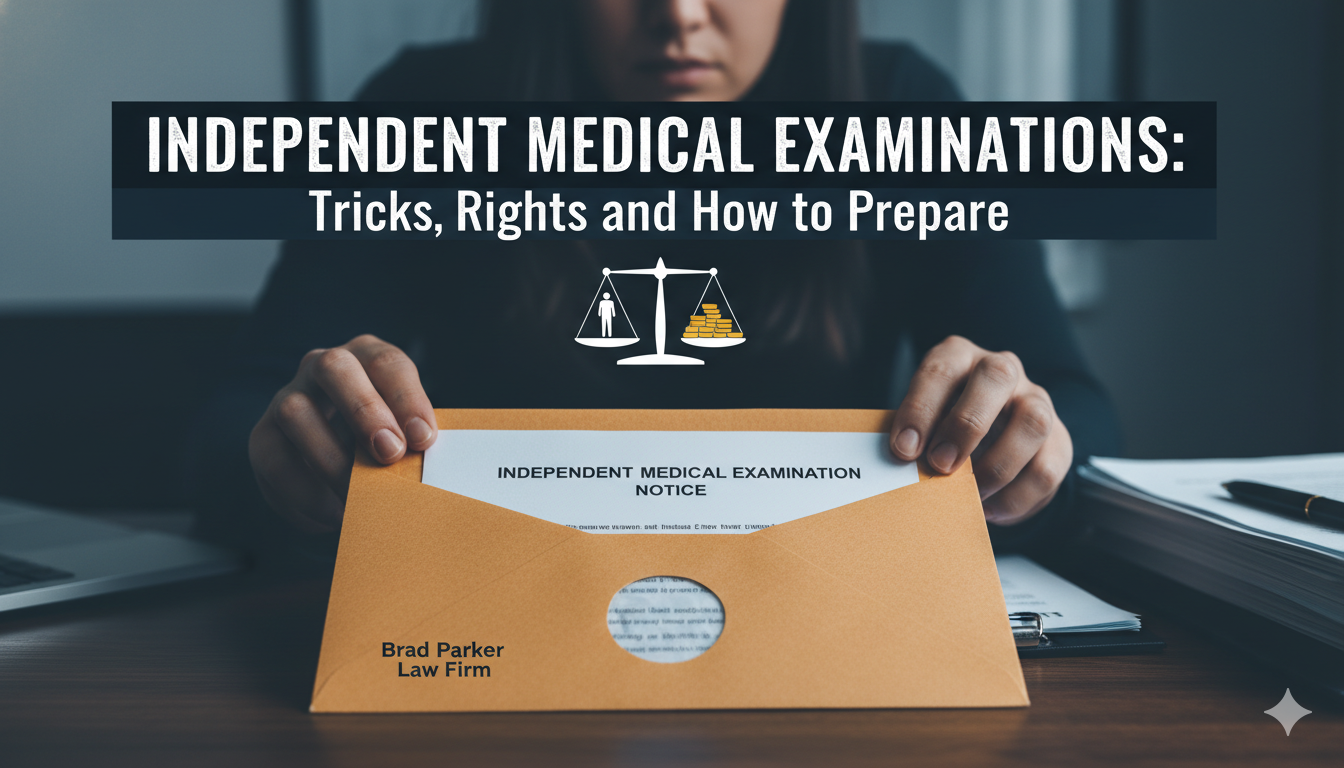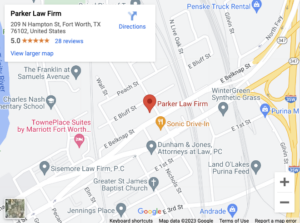Independent Medical Examinations: Tricks, Rights, and How to Prepare

The official-looking envelope arrives in the mail, and your stomach drops. Inside is a letter from the insurance company and a formal notice scheduling you for an “Independent Medical Examination” (IME). The word “independent” is meant to sound reassuring, neutral, and fair. But if you’re feeling a knot of anxiety tighten in your chest, if your gut is telling you this is anything but an impartial check-up, you need to trust that instinct. You are not just being paranoid; you are being perceptive. At Brad Parker Law Firm, we’ve guided countless clients through this exact moment, and we’re here to tell you that your apprehension is justified. You’re about to step into a process that is rarely about your health and almost always about the insurance company’s wealth.
We understand the confusion and fear that letter can cause. After an injury, you’ve placed your trust in your own doctors, the people who have listened to your story, examined you carefully, and developed a treatment plan to help you heal. Now, a stranger hand-picked by the opposing side will pass judgment on your condition, often in a matter of minutes. It feels unfair because, in many ways, it is. But this is not a moment for despair. It is a moment for preparation. The IME is not a test to be survived; it is a critical opportunity for you to present your truth with unshakable confidence. With the right strategic partner by your side, this moment of vulnerability can be transformed into a demonstration of strength.
What is an Independent Medical Examination (IME)?
On paper, an Independent Medical Examination is a medical evaluation conducted by a healthcare professional who has not previously been involved in your care. Its stated purpose is to provide an objective, third-party assessment of your injury, its severity, the necessity of your treatment, and your ability to return to work. Insurance companies, employers, and legal opponents request these exams to get what they claim is an unbiased opinion to help resolve workers’ compensation, disability, or personal injury cases. It sounds reasonable, a way to ensure fairness for everyone involved. However, the reality we see every day in our practice tells a very different story.
IME vs. defense medical exam: key differences
The first and most important thing to understand is the language itself. While the insurance company calls it an “Independent Medical Examination,” we, and many legal professionals, know it by a more accurate name: a defense medical exam (DME). This isn’t just semantics; it’s a fundamental reframing that acknowledges the true nature of the appointment. The doctor you are about to see is not a neutral party. They are a paid consultant, hired by the defense to examine you and produce a report. Their loyalty is not to you or to the truth of your medical condition, but to the entity that signs their checks.
Think of it this way: your treating physician is your advocate for health. Their goal is to get you better. A defense medical examiner’s goal, whether stated or unstated, is to find evidence that can be used to minimize, deny, or devalue your claim. They are looking for reasons to say your injury isn’t as severe as you claim, that it was caused by something else, or that you no longer need the treatment your own doctor prescribed. Recognizing this adversarial dynamic from the outset is the first step in protecting yourself. Your feeling that you’re walking into an ambush is not an overreaction; it is an accurate assessment of the situation.
Why IMEs matter in claims and disputes
The report generated from this single, brief encounter can have a catastrophic impact on your case. An unfavorable IME report can be used by an insurance company to justify cutting off your medical benefits, denying your disability claim, or making a lowball settlement offer in your personal injury lawsuit. The defense will present this doctor’s opinion as objective medical fact, a powerful piece of evidence to counter everything your own trusted physicians have said. They will portray the examiner as an unbiased expert, and their findings can sway judges, juries, and claims adjusters.
This is why the IME is such a high-stakes moment. It is a pivotal point in your journey toward seeking justice, a carefully orchestrated event designed to shift the narrative against you. But knowing this is not a reason to lose hope. It is the reason to get prepared. At Brad Parker Law Firm, we believe in turning this defense tactic into your platform. We’ve seen how a well-prepared client, armed with knowledge and a clear strategy, can navigate this process calmly and effectively, preventing the defense from twisting their story. We treat you like family, and that means we won’t let you walk into that examination room alone and unprepared.
IME Tricks and How to Protect Yourself
The defense medical examiner’s playbook is filled with subtle but effective tactics designed to undermine your credibility and the legitimacy of your injuries. These aren’t just medical procedures; they are investigative techniques. The examiner is not just assessing your physical condition; they are observing your every move, listening to your every word, and looking for any inconsistency, no matter how small. Understanding these common Independent Medical Examination tricks is essential to protecting your rights and ensuring your truth is accurately represented.
Common tactics used by defense in IMEs
One of the most common tactics begins long before you even step into the office: the selection of the doctor. Insurance companies often maintain a list of doctors known for producing reports that consistently favor the defense. These physicians may derive a significant portion of their income from performing IMEs, creating a powerful financial incentive to provide opinions that lead to more referrals. They may also be given a curated or incomplete set of your medical records, a file that conveniently omits the reports from your specialists or the diagnostic tests that most strongly support your case.
Once you arrive, the observation begins. The examiner’s staff may be watching you in the waiting room, noting if you’re reading a book or using your phone in a way that seems to contradict your stated injuries. The surveillance doesn’t stop there. It’s a common and legal practice for insurance companies to conduct pre-examination surveillance, hiring private investigators to film you in the days or weeks leading up to the IME. They hope to catch you carrying groceries, mowing the lawn, or doing anything that can be presented in court to make you look like a liar. Your social media profiles will also be scrutinized for photos or posts that conflict with the limitations you’ve described.
The examination itself is often shockingly brief. It is not uncommon for an IME to last less than 15 minutes, even for complex injuries that have required months of specialized care. This is a deliberate strategy. A rushed, superficial exam is not designed to gain a comprehensive understanding of your condition. It is designed to go through the motions and produce a report that concludes your injuries are minor, exaggerated, or pre-existing. The examiner may ask leading questions, administer tests to gauge symptom exaggeration, or downplay the pain you report. Their report will often be a cookie-cutter summary that dismisses your suffering and provides the insurance company with exactly the ammunition it needs.
Ethical and effective responses during an IME
Faced with these tactics, it’s natural to feel defensive or angry. However, the most effective response is one of calm, consistent honesty. This is where preparation becomes your greatest asset. Before the exam, we review our clients’ entire medical history. The goal is to ensure you can articulate the story of your injury and its impact on your life clearly and consistently, without exaggeration but also without minimizing your pain. Honesty is your shield. Never lie or overstate your symptoms, as this is precisely what the examiner is hoping to catch.
During the exam, be polite and cooperative, but do not volunteer information that is not asked for. Answer the questions asked truthfully and directly. If a physical test causes you pain, say so calmly and immediately. Do not push through the pain to seem tough; this will only be used as evidence that your limitations are not as severe as you claim. Be mindful that you are being observed from the moment you arrive until the moment you leave the property. Your conduct should be consistent with the physical limitations your injuries impose. This isn’t about putting on a performance; it’s about living your truth consistently, especially when you know you are being watched.
Rights and Controls in IMEs
While the IME process can feel like you have no power, you do have rights. Understanding these rights is crucial to leveling the playing field. The insurance company wants you to feel isolated and intimidated, but with an experienced legal advocate, you can assert some control over the situation. We fight tirelessly to ensure our clients’ examinations are conducted as fairly as possible under the circumstances.
Observer rights during an IME
One of the most common questions we hear is, “Can I bring someone with me?” The answer often depends on state law and the specifics of your case, but it is a right worth fighting for. Having a witness present, whether it’s a legal representative, a nurse, or a trusted family member, can serve several important functions. An observer can take detailed notes on the exam duration, the questions asked, the tests performed, and the doctor’s demeanor. This creates an objective record that can be invaluable for challenging an Independent Medical Examination report that is inaccurate or misleading. The mere presence of an observer can also deter the examiner from engaging in overtly unfair or aggressive behavior. We strongly advocate for Independent Medical Examination observer rights because we know transparency is a powerful tool against bias.
Can you refuse an IME? When it’s appropriate and the consequences
This is a critical question with serious implications. In most personal injury and workers’ compensation cases, you cannot simply refuse to attend a scheduled IME without facing severe consequences. If your claim is part of a lawsuit, the defense typically has the right to request an IME under the rules of civil procedure. Refusing to attend could lead to your case being dismissed. Similarly, in an insurance claim, your policy may require you to cooperate with reasonable requests, including an IME. A refusal could be seen as a breach of that contract, giving the insurer grounds to deny your claim outright.
However, this does not mean you are without options. While you likely cannot refuse the exam entirely, your attorney can and should negotiate the terms. We can object to a specific doctor based on a clear history of bias, or we can challenge the location if it requires an unreasonable amount of travel. We can also negotiate the scope of the examination to ensure it is limited to the injuries relevant to your claim. Answering the question, “Can I refuse an Independent Medical Examination?” is less about a simple yes or no, and more about a strategic legal approach to managing the process and protecting your rights every step of the way.
Preparing for an IME: Practical Checklists
The feeling of control comes from a solid plan. Walking into a defense medical exam without preparation is like navigating a minefield blindfolded. At our firm, we don’t just tell our clients what to expect; we walk them through a detailed preparation process. This isn’t a checklist of things to memorize; it’s a strategy for presenting your truth so clearly and consistently that it cannot be ignored or distorted.
Documentation and records to bring
Before you go, it is essential to understand your medical history. We will review your records with you, focusing on the timeline of your injury, the treatments you have received, the diagnoses from your doctors, and the specific ways your life has been impacted. You should arrive at the exam with your identification and a list of your current medications. It is often a good idea to create a concise, written summary of your medical timeline for your own reference, but do not give this or any other new document to the examiner unless your attorney has advised you to do so. The goal is for you to be the master of your own story, able to recount it accurately without relying on notes, which the examiner might try to claim are a script.
What to expect during the examination
You should expect the examination to begin the moment you are on the property. Behave consistently with your injuries at all times. Inside the examination room, the doctor will likely start by asking you to describe the incident that caused your injury and the symptoms you have been experiencing. This is your opportunity to calmly and truthfully state the facts as you have consistently reported them to your own doctors. The physical examination may be brief and may feel perfunctory. The doctor might poke and prod, ask you to perform certain movements, and measure your range of motion. Remember to communicate clearly when a movement causes pain. Do not try to be a hero. Your honest feedback is a critical part of the record.
How to record information and preserve credibility
Immediately after you leave the examination, your work is not done. As soon as you are in your car or a quiet place, write down everything you can remember about the appointment. How long did the actual examination last? What questions did the doctor ask? What physical tests were performed? How did the doctor respond when you indicated you were in pain? Did the doctor’s comments seem dismissive or unprofessional? This contemporaneous record, created while the memory is fresh, can be an incredibly powerful tool for your attorney. It provides the details we need to dissect the examiner’s report and expose any inaccuracies, omissions, or clear signs of bias when challenging an IME report.
Long-Tail Opportunities and Topics
The IME process is complex, with many specific considerations depending on the nature of your claim. Understanding your Independent Medical Examination patient rights is paramount, and these rights can extend into specialized areas. For example, an Independent Medical Examination for disability claims often carries immense weight, as the insurer will use the report as a primary basis for approving or denying long-term benefits. In these cases, the examiner’s opinion on your functional capacity and ability to work is the central issue.
Similarly, some cases may involve an Independent Medical Examination and a psychological assessment. This is common in claims where emotional distress, PTSD, or a traumatic brain injury is a significant component of your damages. Preparing for a psychological IME requires a unique strategy that focuses on honest and consistent reporting of your symptoms without fear of judgment. In all these scenarios, having a legal team that understands the nuances of preparing for a defense medical exam is not just helpful, it’s essential. The right preparation ensures your physical and psychological injuries are presented accurately, safeguarding your claim from the defense’s attempts to downplay your suffering. We also work tirelessly to protect Independent Medical Examination observer rights in these specialized exams, knowing that a witness is a key part of ensuring fairness.
State-Specific Regulations and Local Nuances
It is crucial to recognize that the rules governing IMEs vary from state to state. State-specific regulations can have a major impact on your rights and the insurance company’s obligations. This is where having a local, experienced attorney becomes a decisive advantage. A lawyer who deeply understands the legal landscape in your state can leverage those rules to your benefit, providing a layer of protection that you would not have otherwise.
Why state rules matter and how to tailor content
In Texas, for example, Rule 204 of the Texas Rules of Civil Procedure governs IMEs. This rule requires the party requesting the exam to show “good cause” and ensures that the examination is conducted at a reasonable time and place, and in a reasonable manner. As a firm deeply rooted in Texas, we use this rule proactively. We don’t just accept the insurance company’s demands. We scrutinize their request to ensure it meets the “good cause” standard, and we negotiate the exam conditions to protect our clients. We can argue for the presence of an observer or even a video recording, using the specific provisions of state law to introduce transparency into a process designed to be opaque.
State examples and best practices
This local expertise is not just a footnote; it is a core part of our strategy. Knowing the local judges, the reputations of various IME doctors, and the specific legal precedents in Texas courts allows us to build a stronger, more resilient case for you. We tailor our preparation strategy based on the realities of our jurisdiction. This commitment to understanding the local nuances is part of what it means to be the attorney you want but hope you never need. We’re not just fighting a legal battle; we’re navigating a system we know inside and out, for the benefit of the people and families in our community.
Legal Perspectives and Expert Input
Successfully navigating the IME process requires more than just knowing what to say. It requires a comprehensive legal strategy that anticipates the defense’s moves and builds a powerful counter-narrative. This is where the experience of a seasoned personal injury firm becomes your greatest weapon. We are not just your advisors; we are your advocates, ready to challenge a biased system on your behalf.
Collaboration with legal professionals
Our approach is built on collaboration. We work closely with you, your treating physicians, and a network of trusted medical experts to build a cohesive and compelling story of your injury. When a biased IME report comes back, we are ready. We know how to dissect it, line by line, comparing it with the extensive records from your own doctors. We use our trial experience to depose the defense examiner, cross-examining them on their methods, their financial ties to the insurance industry, and the glaring omissions in their report. We bring in our own respected experts to provide second opinions, functional capacity evaluations, and life care plans that provide a clear, evidence-based account of your condition and future needs. We fight giants in court, and that includes challenging the so-called “expert opinions” that are designed to deny you justice.
Frequently Asked IME Questions (FAQ)
The prospect of an IME naturally brings up many questions. Having clear, direct answers can help replace anxiety with confidence. Here are some of the most common questions our clients ask.
Can I refuse an Independent Medical Examination?
As we’ve discussed, in most situations, an outright refusal is not a viable option and can jeopardize your entire case. If you are ordered to attend an IME as part of a lawsuit or as a condition of your insurance policy, you must comply. However, this does not mean you have to accept the defense’s terms without question. The proper response is not to refuse, but to have your attorney engage, negotiate, and establish clear ground rules that protect your rights throughout the process.
What should I bring to an Independent Medical Examination?
You should bring very little. Carry your photo identification, your insurance information, and a list of your current medications. Do not bring your own medical records, diaries, or extensive notes unless specifically advised to do so by your attorney. The less ammunition you provide the examiner, the better. Your most important asset is your own clear, honest recollection of your medical journey, which you will have reviewed with your legal team beforehand.
How long does an Independent Medical Examination take?
The duration of an IME can vary, but you should be prepared for it to be surprisingly short. Many exams last for 15 minutes or less. This is often by design. A brief, superficial examination makes it easier for the examiner to overlook the complexities of your condition and conclude that your injuries are not significant. This is why your own detailed notes, taken immediately after the exam, are so vital. Documenting that a doctor made a sweeping judgment about your future after a ten-minute evaluation can be a powerful way to discredit their report later.
You received that letter because the other side is building a case against you. But you don’t have to face this alone. You don’t have to be a victim of their strategy. The Independent Medical Examination is their tool, but with the right preparation, it can become your stage a place where you calmly and confidently affirm the truth of what you have endured.
At Brad Parker Law Firm, we see you, we hear you, and we are ready to fight for you. We will help you prepare, stand with you through the process, and fight tirelessly to ensure your story is heard. If you’ve been asked to attend an IME, don’t wait. Contact us today for a free consultation, and let us turn your fear into empowerment. Because we treat you like family, and your fight is our fight.


